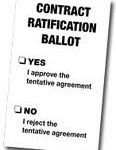By Therese Norton
 In a recent decision, PERC Hearing Examiner Page A. Garcia held that the International Organization of Masters, Mates and Pilots union provided employees with adequate notice and opportunity to vote on the ratification of tentative agreements the union had negotiated with the Washington State Ferries. Washington State Ferries, Decision 11899 (MRNE, 2013).
In a recent decision, PERC Hearing Examiner Page A. Garcia held that the International Organization of Masters, Mates and Pilots union provided employees with adequate notice and opportunity to vote on the ratification of tentative agreements the union had negotiated with the Washington State Ferries. Washington State Ferries, Decision 11899 (MRNE, 2013).
Individual employees from the masters and mates union filed various interference complaints against the union with PERC. The employees complained that bargaining unit members only had two days’ notice before a contract ratification vote and some missed the vote entirely. They alleged that the union was arbitrary and acted in bad faith in its representation of the employees by conducting a flawed contract ratification vote.
As the exclusive bargaining representatives under the collective bargaining statute, a union owes its members a duty of fair representation. That duty includes fairly representing the interests of all bargaining unit members during negotiations, administration, and enforcement of collective bargaining agreements. Fair representation means that the union must deal with all employees “without hostility, discrimination, or arbitrary conduct, and in good faith.” A union breaches its duty of fair representation if its behavior is deemed irrational.
In this case, the parties’ CBA in effect at the time of the vote was silent on contract ratification procedures. The union’s constitution, however, provided every member the right to vote on the ratification of any CBA, subject to reasonable rules. The union and Washington State Ferries faced a legislatively mandated time constraints to bargain a successor CBA. Over six months, the union and employer had engaged in over 30 negotiation session and were in mediation until the morning of the ratification vote. The union emailed its bargaining unit members regarding an “emergency” special union meeting, identified three voting locations, and allowed for voting by phone or in person. The union admitted there were some technical difficulties associated with distributing the completed tentative agreements on the day of the vote.
The examiner reasoned that given the mandated time constraints, the union’s interpretation of its governing documents was “neither unfair nor unreasonable.” The examiner noted that the union and the employer engaged in collective bargaining up until the “eleventh hour” in order to meet the deadlines. On the issues of the proxy voting and whether two individuals were members in good standing, the examiner concluded that these matters are internal union affairs that should be resolved via internal mechanisms.
Ultimately, the examiner evaluated the totality of the circumstances and found that the union met its duty of fair representation. The examiner explained:
The union sought and received legal counsel, gave bargaining unit members the opportunity to ask questions and discuss the tentative agreements, and made sincere and good faith decision about the timing of the release of the tentative agreements and how to conduct contract ratification voting considering the legislative time restraints and the interests of the parties.
The examiner also held that union also did not interfere with employee rights and dismissed the complaints.


